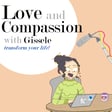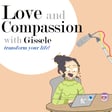
Ep.54- Conversation with Tina O Hoang: Addressing people pleasing with Compassion
Gissele Taraba: [00:00:00]
Hello. And welcome to the love and compassion podcast with Gissele.
We believe that love and compassion have the power to heal our lives and our world. Don’t forget to like, and subscribe for more amazing content. Today, we’re going to talk about people pleasing and how compassion can help us address those needs.
Today I’m talking with Tina O Hoang, who is a disabled recovering people, pleaser and podcaster.
She strives to ensure women have the space to choose themselves and to share their courageous stories. Whether it be changing how They’re perceived within a family dynamic, leaving a comfortable nine to five or advocating for themselves. She believes that women of color are allowed to take the first step and don’t need permission to do so.
After someone told her that her passivity was unattractive, she took it and decided to become as assertive and courageous as she could ever be. With a master’s [00:01:00] degree in career counseling, Tina also understands the hardship of career changes
She knows that even when we’re scared of making the first step, we need to just say F it and do it anyways.
Please join me in welcoming Tina. Hi Tina. Hi Giselle. Yay. Thank you for having me. Oh no, thank you for being on the show. Let’s talk people pleasing. As a person who is the complete opposite, because I didn’t feel loved or accepted, I just went, screw it. I’m just going to do what I can.
And I was so confrontational. So if you could share a little bit with me about how the opposite feels, the people pleasing and what got you to be in that state.
Tina Juan: Yeah. So I think for the longest time, I think honestly, like, My feeling like how you are, it was deep inside me this whole time.
F everything..
I don’t care about it. I just want to do everything. But somehow, I think maybe within my own culture, family is important. [00:02:00] Because in my culture, whatever you do as a child reflects to your parents and people blame. My parents, if I were to act differently, so like if I went to act out and just like screw everything, you know, do all the bad things you could think of, there’s like, Oh, is your mom’s fault?
That’s why she can’t raise you. Right. Or is your dad’s fault? They, he didn’t know how to discipline you in the right way. And so everything goes back to my parents and. You know, growing up too is honestly, first few things I remember of making sure my mom was always happy. I think that’s like the main thing for me is like,we grew up in a single household, and she was always, she was working double shift every single day, like seven days a week.
She was, she was a business owner, and the fact that, um, the fact that she [00:03:00] would leave work for like, for lunch. Come over, come to school, hang out with me and my brother, and then go back to school and then go back to work. Yeah, and so, you know, so there was this, so there was this, um, precedent of mom is making all these sacrifices for us.
as a single mom, I need to make sure that whatever she does is makes her happy.
Gissele Taraba: Yeah,
Tina Juan: and also need her to accept me as a person because she’s because I think in the ages around, I think the primal age is like zero to seven.
That’s where like, Okay. You really need your parents around that time, she was working, you know, and that gravitation of like, I need people to love me, I need people to like me, if they don’t, then if I don’t act a certain way, they’ll leave, they’ll leave me forever. And so that kind of that grew the notion of like, [00:04:00] pleasing people pleasing

